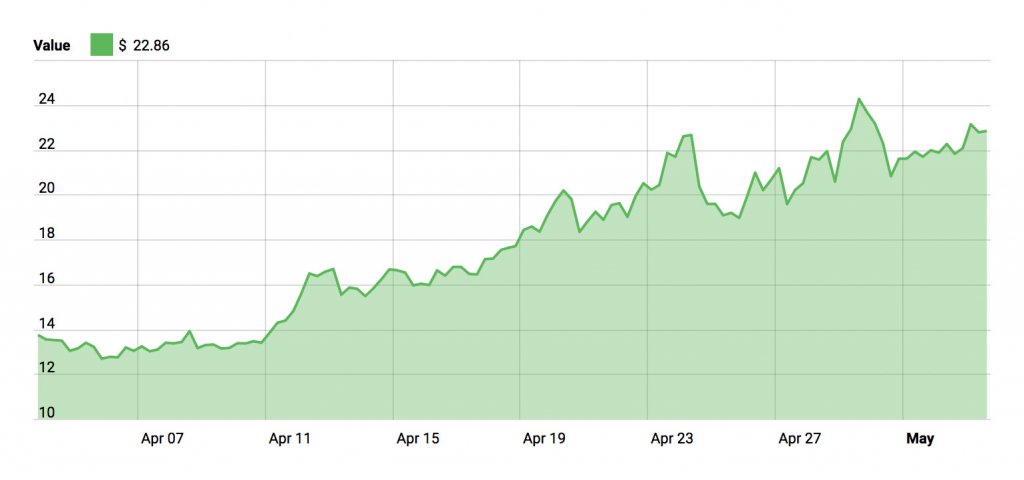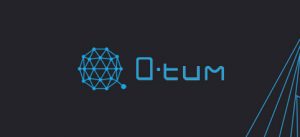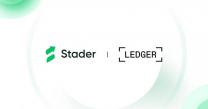 Qtum May Update: Up 25% Over the Past Month On dApp Developments
Qtum May Update: Up 25% Over the Past Month On dApp Developments Qtum May Update: Up 25% Over the Past Month On dApp Developments

Photo by Alexander Ramsey on Unsplash
Qtum has experienced a bullish past month of growth. The young project has exhibited a series of healthy leaps after the launch of its first-of-a-kind “cryptogame,” Heroes.
Sitting just shy of a $2 billion market cap, Qtum has done remarkably well to slink under the radar of most — yet its recent performance would suggest this low-profile romance period is drawing to a close.


Firing off with an 18% hike in the final week of April, the 18th-largest cryptocurrency by market cap appears to be awakening from its slumber — Qtum raising the curtain on a series of promising installations including dApp-launches and game partnerships.
What is Qtum?
Blending the functionalities of Bitcoin and Ethereum, Qtum, or is an open-source blockchain designed to offer more secure smart contracts.
A 2017 fork of the Bitcoin core protocol, Qtum’s architectural proposition is unique — offering the trustless peer-to-peer transaction of BTC — while emulating Ethereum’s smart contract and dApp functionality.
Existentially, the Qtum Foundation would point to the significant failure of Ethereum smart contracts for validation of their mission — to leverage the proven usefulness of Ethereum, adding the esteemed security of Bitcoin.
Clocking in at a 0.36% in a recent report, Ethereum’s smart contract failure rate may sound like small change to the layman. To businesses and institutions exchanging millions, on the other hand, any failure would be considered a cataclysmic failure.
Armed with Bitcoin-friendly smart contracts, Qtum’s platform is the blockchain architect’s pipe dream — permitting dAapps to be written in a whole chorus of programming languages.
Qtum Heroes
It seems that beneath Qtum’s corporate exterior there lies a touch of funk — the project venturing into the emerging ‘cryptogaming’ market with its first game, Heroes. A bloodthirsty gladiator game, Heroes, has broken new ground as the very first blockchain-based player vs. player game to date.
Just find a hero looks like you!
Qtum Heroes invitation registration launched!@QtumOfficial @PatrickXDai @MattLeeMA #Blockchain #QtumHeroeshttps://t.co/8CtObJHbMq— 777 (@Bingo_Platform) April 27, 2018
Where pioneering crypto-games have revolved around the exchange of collectibles — such as the notoriously resource-intensive Cryptokitties — Heroes’ adversarial twist is a novel touch indeed — players claiming being rewarded in fully exchangeable crypto-assets for successfully slaying their opponent.
Built by Mob Arts, the game may follow in the chasmic footsteps of the studio’s previous effort, House of Heroes — which saw prolific adoption amongst the burgeoning Asian market. Should Heroes become such a digital sensation, Qtum would enjoy a hearty step-up in users as potentially millions of people trade hands over virtual corpses.
Bodhi: Qtum’s First Working Dapp
Bodhi Prediction Market, Qtum’s debuting testnet dApp, has once again broken ground for Qtum — with the launch of the very first working dApp on its mainnet.
“Bodhi Prediction Market Platform Now Live on Qtum Mainnet” by @bodhitoken https://t.co/a6hxBDwLco
— crypto_bodhi (@crypto__bodhi) April 25, 2018
Currently, in its beta phase, the prophet-like Bodhi leverages public sentiment to predict future events; such as sports, politics, economic developments and anything that enters the public arena. As China’s Bodhi takes its baby steps, the project will invariably prove pivotal in boosting early adoption of the Singaporean blockchain, as players gleefully collect QTUM tokens from their vanquished foes.
Qtum founder Patrick Dai noted:
“We’re excited to have Bodhi lead the way by launching the first DApp on Qtum. Bodhi is serverless and runs on blockchain, it’s a real working decentralized application and that’s what this is all about.”
Qtum: Time to Shine?
Sporting a colossal market cap and bizarrely low profile, Qtum may befuddle western investors — who would ask how such a weighty offering could sneak unnoticed in a community that breathes virality. See, while Qtum’s proposition may be uniquely pragmatic, its team appears indifferent to popularizing the project’s western presence.

Where Qtum has been denied entrance to the hall of fame, it boasts an illustrious list of dApps scheduled for launch. Selections are eclectic, yet promising — from Datawallet’s data blockchain wallet to the more humanistic Halalchain — a government-affiliated project bringing relief and reassurance to the world’s 1+ billion Islamic population.
The young Qtum’s unique architecture and impressive momentum are patently good omens — taking a series of strides since its 2017 mainnet debut. That said, the launch of Heroes is not exactly a step towards its earnest enterprise-grade focus per se — Qtum will surely need to assert this position to hold its own in the ruthlessly competitive top-20.



























































